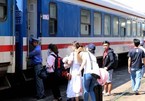VND1.2 trillion loss in 2020 predicted
The second outbreak of Covid-19 upset the business plan.

Just within 18 days, from July 23 to August 9, 2020, the number of returned tickets was worth VND34.4 billion. Some localities which were hotbeds of the outbreak, including Da Nang, Quang Nam, Quang Ngai and Hai Duong, asked VNR not to pick up or drop off passengers at local stations because of social distancing.
VNR also had to take out 6 out of 10 trains on the Hanoi-HCM City routes, the ones which bring high revenue to the corporation. The trains on other routes were also reduced, and trains only ran on weekends.
The holding company reported modest revenue of VND1.164 trillion in the first eight months of the year, just 72.5 percent of the same period last year and 55.5 percent of the yearly plan. The consolidated revenue of the whole VNR was VND4.088 trillion, equal to 77.8 percent of the same period last year and 66.4 percent of the yearly plan.
It is estimated that VNR will incur a loss of VND1.2 trillion in the year 2020 with cash flow declining since March 2020, and with total cash flow deficit roughly VND1 trillion.
The cash flow balance at its subsidiaries, the Vietnam Railways Transport and Sai Gon Railways Transport, is facing difficulties. With the former’s predicted loss of VND410 billion and the latter’s loss of VND357 billion, the two companies will see a cash flow deficit of VND1 trillion.
Both companies in recent years have invested VND1.5 trillion in building new or upgrading wagons, so they will be under pressure to pay debts.
The cash flow imbalance of the subsidiaries will directly affect VNR’s cash flow, because the subsidiaries are using the services of the holding company. The amount of money the subsidiaries have to pay to the holding company is up to VND1.6 trillion.
The biggest challenge in 100 years
VNR’s Chair Vu Anh Minh said the internal problems have existed for many years, and now with Covid-19, VNR faces its biggest challenge over the last 100 years.
According to Dang Sy Manh, general director of VNR, the corporation is asking the State Capital Management Commission (SCMC) to report VNR’s problems to the Prime Minister and appropriate agencies and ask to reduce the railway infrastructure use fee (8 percent of transport revenue).
| The number of train trips Vietnam Railways (VNR) provided in February-May 2020 decreased by 2,886 compared with the same period last year, mostly because of Covid-19. The occupancy rate in H1 was only 56 percent. |
It has also asked to exempt, reduce or extend the deadline of the land use fee payment, extend the bank debt payment, and ease lending interest rates.
Under Decree 65/2018, VNR will have to replace all expired locomotives and wagons in a 3-year roadmap which will end in 2021. This means that VNR will have to liquidate 60 locomotives, nearly 1,000 cargo wagons and 500 passenger wagons. It will have to arrange VND6.822 trillion to have new equipment.
In the current conditions, VNR is incapable of implementing the requirement.
VNR has requested that SCMC and the Ministry of Transport (MOT) extend the deadline for the implementation of the decree, or add clauses to the implementation roadmap. The vehicles that have expired but still work well should be allowed to be used, if they meet technical and environmental requirements.
At the working session between SCMC and VNR, chair of SCMC Nguyen Hoang Anh said VNR’s problems originated from policies and mechanisms, not from the governing body VNR is under, SCMC or MOT.
Anh confirmed that SCMC has reported VNR’s problems to the government and asked the Prime Minister to instruct MOT and the Ministry of Finance (MOF) to develop solutions to help VNR overcome its problems.
Vu Hoang

Private investors lack interest in railway projects
Hundreds of trillions of dong of private capital have been mobilized for transport development, but most of these have been for roads and none for railways.

Vietnam Railway launches app to sell tickets
The Vietnam Railways Corporation (VNR) officially launched an application to buy train tickets and pay online on smartphones from July 15 to improve customer services.